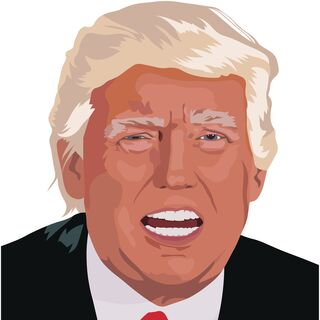President Donald Trump
The Emotions of Donald Trump
Trump often expresses or evokes certain kinds of emotional experiences.
Posted October 31, 2020 Reviewed by Matt Huston

If we compare Donald Trump to previous presidential candidates, we will likely notice a few key differences. For instance, consider his style of communication. A 2017 analysis of Trump’s communication style concluded that his speech, compared to his competitors in the primaries, was more grandiose, included more first-person pronouns, a greater voice pitch variability, and informal communication (e.g., use of non-standard and simple words).
Another investigation compared Trump with Hillary Clinton and found Trump was more negative and present-focused (as opposed to Clinton’s positive and future-focused style), was more likely to try to connect with voters’ emotions (rather than logical discussions of policies), and often tried to distinguish himself from his competitors.
What about Trump’s emotions? Though I know of no study that has systematically studied Trump’s emotional repertoire, I have observed that Trump often expresses or evokes a range of emotional experiences that prominently include anger, hubristic pride, humiliation, disgust, and paranoia.
Anger
Trump’s anger is well known. In fact, according to one psychologist, “anger may be the operative emotion behind Trump’s high extroversion as well as his low agreeableness. Anger can fuel malice, but it can also motivate social dominance, stoking a desire to win the adoration of others.” Trump sometimes expresses his anger in messages he posts on Twitter, which is appropriate, given that Twitter favors “simplicity, impulsivity, and incivility.”
Pride
Psychologist Jessica Tracy says examples of “conceited and hubristic pride can be found in Donald Trump’s regular reminders to everyone of his wealth, intelligence, and business acumen.”
Of course, we desire to see pride expressed by a president. But there are differences between Trump’s pride and, say, Obama’s pride. Martha Claeys argues, “Obama’s appeal to pride starts from an assumption of equality, and seeks to unify.” For Trump, however, the reference to pride “assumes opposition and hierarchy, and sets out to polarize.”
Humiliation
Also common in Trump’s speeches and messages are references to humiliation. In “The Art of Masculine Victimhood,” Paul Johnson notes, “Trump’s repeated invocations of disturbing concepts and images, such as death, destruction, humiliation, submission, and rape, appeal to the audience’s fascination with threatened marginalization.”
Even Trump’s political strategies may be related to his preoccupation with humiliation. As Thomas Wright says regarding the 2020 killing of Soleimani (the Iranian general), “Trump does not hate Iran per se—his desire for talks is evidence of that—but he does have an obsession with avoiding a humiliation.”
Disgust
Commenting on Trump’s frequent references to disgust, Weinschenk and Dawes observe, “Trump’s rhetoric on disgust and purity during the campaign likely made it easier for voters to connect their moral foundations to the candidates. During the 2016 election, Trump regularly invoked the emotion of disgust.”
Michael Richardson, Ph.D., cites a number of other examples of Trump expressing the emotion of disgust (e.g., Hillary Clinton taking a bathroom break, Miss Universe Alicia Machado’s weight gain). The Mexico-U.S. border wall and Muslim ban, Richardson says, are about purity too, not just fear, as is “draining the swamp of Washington, D.C.”
Paranoia
Last, Trump’s support of conspiracy theories and his many references to fake news and witch hunts are examples of messages that may reflect or play to people's paranoia. As psychologists van Prooijen and Douglas argue, “The potential impact and breadth of conspiracy theories was underscored in 2016, when Donald Trump was elected US President despite propagating a range of highly implausible conspiracy theories,” such as the “allegations that climate change is a hoax perpetrated by the Chinese, that Barack Obama was not born in the U.S., and that vaccines cause autism.”
***
I do not know Donald Trump personally, so I have no idea to what extent the emotional experiences above are representative of the range of emotions he experiences or expresses to people close to him, like his family.
Perhaps his public persona differs from the Donald his family knows. Maybe there, he shows more vulnerability and expresses emotions like fear, sadness, and shame more frequently. (Note, shame differs from humiliation in that shame is usually associated with self-blame, but humiliation with other-blame.)
Nevertheless, we can only comment on the Donald we get to see.




